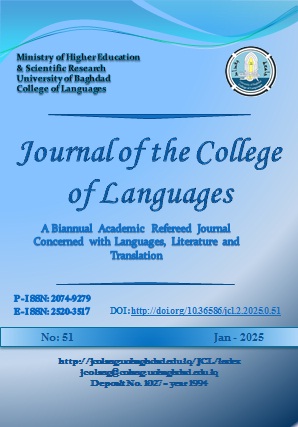تحليل الجدل في سورة الضحى على ضوء النموذج الجدلي لأوليفييه ريبولl
DOI:
https://doi.org/10.36586/jcl.2.2025.0.51.00019الكلمات المفتاحية:
الحجاج، الحجاج البلاغي، نموذج ريبول، سورة الضحىالملخص
فالتأثير على الآخرين والإقناع في الحوارات الإنسانية عنصر فاعل وبارز. وبالتالي فإن الجدال هو أحد الجوانب المميزة لهذه الحوارات. بمعنى آخر، الجدال هو أحد استخدامات اللغة لإقناع الجمهور. وفي هذا السياق تلعب البلاغة دورا حاسما في بنية الخطابات لارتباطها باستخدام اللغة والأساليب المرتبطة بحالة وشروط تكوين الجملة. ومن هذا المنطلق، فإن البلاغة ليست مجرد أداة لإنتاج النصوص، بل هي إحدى الأدوات المهمة لخلق أفق رؤية للغة وقضايا الخطاب المختلفة. ومن خلال دراسة الظواهر الأسلوبية ودراسة علاقتها بمستويات الإدراك المختلفة، يكتشف الباحث في مجال البلاغة الطبقات النفسية والثقافية والاجتماعية الخفية للنص. ومن مناهج تحليل الجدال هو منهج الجدال البلاغي لأوليفييه ريبول، الذي يعتبر الجانب البلاغي في أي خطاب هو الشيء الذي يجعل ذلك الخطاب مقنعا، ويحدث ذلك من خلال وحدة الشكل والمضمون. ونهدف في هذا المقال إلى تحليل المستويات المختلفة لسورة الضحى وفق أنموذج ربول. وتشير نتائج البحث إلى أنه في سورة الضحى، تم توظيف الأقسام التصويرية الثلاثة لنموذج ربول بما يتماشى مع الهدف الجدلي للسورة. وعلى المستوى الصوتي هناك علاقة وثيقة بين الأصوات والدلالات، وهو ما يمكن ملاحظته في النهايات المقافية للسورة. وفي قسم الصور البنيوية، فإن استخدام عناصر مثل القطع والقسم والتوكيد والتقديم والتأجيل قد ساهم بنجاح في تحقيق الهدف الجدلي للسورة.
المراجع
Al-Alusi, Muhammad Ibrahim (1415 AH). Ruh al-Maani fi Tafsir al-Quran al-Azim wa al-Sab al-Mathani [The Spirit of Meanings in the Interpretation of the Great Quran and the Seven Oft-Repeated Verses]. Beirut: Dar al-Kutub al-Ilmiyah.
Al-Ansari, Ibn Hisham (1367 AH). Mughni al-Labib an Kutub al-Aarib [The -Sufficient of the Intelligent Concerning the Books of the Grammarians] (3rd Ed.). Qom: Intisharat Tabrizi.
Al-Ansari, Ibn Hisham (1990). Al-Sirah al-Nabawiyah [The Prophetic Biography]. Damascus: Dar al-Kitab al-Arabi.
Al-Baqillani (n.d.). Ijaz al-Quran [The Inimitability of the Quran]. Egypt: Dar al-Maarif.
Al-Jurjani, Abd al-Qahir (n.d.). Dalail al-Ijaz [Evidences of Inimitability]. Cairo: Matbaat al-Madani.
Al-Qayrawani, A. A. H.R (1963). Al-Umdah fi Mahasin al-Shir wa Adabihi wa Naqdihi [The Pillar in the Beauties of Poetry, Its Etiquettes, and Its Criticism]. (M. M. Abd al-Majid, Ed.) (3rd Ed.) Egypt: Maktabat al-Saadah.
Al-Rafii, Mustafa Sadiq (1973). Ijaz al-Quran wa al-Balaghah al-Nabawiyah [The Inimitability of the Quran and Prophetic Rhetoric]. Beirut: Dar al-Kitab al-Arabi.
Al-Salam, Abdullah (1991). Majaz al-Quran [Figurative Language in the Quran]. London: Manshurat al-Furqan li al-Turath al-Islami.
Al-Samurrai, Fadl (1998). Al-Tabir al-Qurani [Quranic Expression]. Amman: Dar Ammar.
Al-Saran, Muhammad (1997). Ilm al-Lughah [Linguistics]. Cairo: Dar al-Fikr al-Arabi.
Al-Suyuti, Jalal al-Din (1974). Al-Itqan fi Ulum al-Quran [The Perfect Guide to the Sciences of the Quran]. Egypt: Al-Hayah al-Misriyah al-Ammah li al-Kitab.
Al-Umri, Muhammad (2012). Al-Balaghah Bayna al-Takhyil wa al-Tadawul [Rhetoric Between Imagination and Pragmatics]. Morocco: Dar Ifriqiya.
Al-Zamani, Kamal (2016). Hijajiyat al-Uslub fi al-Khitabah al-Siyasiyah lada al-Imam Ali alayhi al-Salam [The Argumentative Style in the Political Speeches of Imam Ali, Peace Be upon Him]. Morocco: Alam al-Kutub al-Hadith.
Anis, Ibrahim (n.d.). Al-Aswat al-Lughawiyah [Linguistic Sounds]. Cairo: Maktabat Nahdat Misr.
Bint al-Shati, A. A. (n.d.). Al-Tafsir al-Bayani [The Rhetorical Interpretation]. Cairo: Dar al-Maarif.
Blieč, Hana (1999). Al-Balaghah wa al-Uslubiyah Nahwa Namudhaj Simaii li Tahlil al-Nass [Rhetoric and Stylistics: Towards a Semiotic Model for Text Analysis]. Beirut: Ifriqiya al-Sharq.
Ibn Ashur, Muhammad al-Tahir (1420 AH). Al-Tahrir wa al-Tanwir [Liberation and Enlightenment]. Beirut: Muassasat al-Tarikh al-Arabi.
Ibn Jinni, Abu al-Fath Uthman (n.d.). Al-Khasais [The Characteristics] (4th Ed.). Cairo: Al-Hayah al-Misriyah al-Ammah li al-Kitab.
Lushin, N.H (2001). Mabahith fi Ilm al-Lughah wa Manahij al-Bahth al-Lughawiyah [Topics in Linguistics and Linguistic Research Methods]. Alexandria: Al-Maktabah al-Jamiyah.
Najlah, M.A (1981). Lughah al-Quran al-Karim fi Juz Amma [The Language of the Noble Quran in Juz Amma]. Beirut: Dar al-Nahdah al-Arabiyah.
Perelman, C (2020). Al-Imbraturiyah al-Khitabiyah Sinaah al-Khitabah wa al-Hijaj [The Rhetorical Empire: The Making of Rhetoric and Argumentation]. Beirut: Dar al-Kutub al-Jadidah al-Muttahidah.
Qadir, F G. (2011). Tajalliyat al-Dalalah al-Ihaiah fi al-Khitab al-Qurani [Manifestations of Connotative Meaning in Quranic Discourse] ] (1st Ed.). Irbid: Alam al-Kutub al-Hadith.
Reboul, Olivier (2017). Madkhal ila al-Khitabah [Introduction to Rhetoric]. Morocco: Dar Ifriqiya al-Sharq.
Sammud, Hammadi (n.d.). Ahamm Nazariyat al-Hijaj fi al-Taqalid al-Gharbiyah min Aristu ila al-Yawm [The Most Important Theories of Argumentation in Western Traditions from Aristotle to Today]. Tunisia: Al-Matbaah al-Rasmiyah li al-Jumhuriyah al-Tunisiyah.
Sulah, Abd (2011). Fi Nazariyat al-Hijaj: Dirasat wa Tatbiqat [On the Theory of Argumentation: Studies and Applications]. Tunisia: Dar al-Janub li al-Nashr wa al-Tawzi.
Tarus, Muhammad (2005). Al-Nazariyah al-Hijajiyah min Khilal al-Dirasat al-Balaghiyah wa al-Mantiqiyah wa al-Lisaniyah [The Theory of Argumentation Through Rhetorical, Logical, and Linguistic Studies]. Qatar: Dar al-Thaqafah.
التنزيلات
منشور
إصدار
القسم
الرخصة
الحقوق الفكرية (c) 2025 مجلة كلية اللغات

هذا العمل مرخص بموجب Creative Commons Attribution 4.0 International License.








